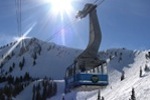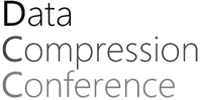|
Call for Papers |
||
LocationSnowbird, Utah (all sessions at the Cliff Lodge). More > DatesTuesday March 21 - Friday March 24, 2023Reception: Tuesday evening Presentations: Wednesday - Friday Keynote Addresses"Perception: The Next Milestone in Learned Image Compression" Special Sessions"Video Coding and Quality Assessment" Sponsorship:
Proceedings published byIEEE Computer Society Press CPS Online. More > Program Committee
ThemeAn international forum for current work on data compression and related applications. Both theoretical and experimental work are of interest. Topics of interest include but are not limited to: Lossless and lossy compression for storage and transmission of specific types of data (including text, gray scale and color photographs, multi-spectral and hyper-spectral images, palette images, video, movies, audio, music, maps, instrument and sensor data, space data, earth observation data, scientific data, weather data, medical data, graphics data, geometry data, 3D representations, animation, bi-level images / bit-maps, web content, web graphs, etc.), source coding, source coding in multiple access networks, joint source-channel coding, rate distortion coding, rate allocation, multiple description coding, quantization theory, vector quantization (VQ), multiple description VQ, transform based methods (including DCT and wavelet transforms), parallel compression algorithms and hardware, error resilient compression techniques, adaptive compression algorithms, browsing and searching compressed data, compressed data structures, applications to immersive media, inpainting-based compression, perceptual coding, visual search, object recognition, applications of neural networks and deep learning (e.g. CNN's) to compression, string searching and manipulation used in compression applications, fractal based compression methods, information retrieval employing compression techniques, steganography / hidden information with respect to compressed data, minimal length encoding and applications to learning, system issues relating to data compression (including error control, data security, indexing, and browsing), compression applications and issues for computational biology and bioinformatics, compression applications and issues for the internet, compression applications and issues for mobile computing, applications of compression to file distribution and software updates, applications of compression to file storage and backup systems, applications of compression to data mining, applications of compression to image retrieval, applications of compression and information theory to human-computer interaction (HCI), development of and extensions to compression standards (including the HEVC, JPEG, MPEG, H.xxx, and G.xxx families and including compression of specific image types such as plenoptic images, point cloud images, and light field images), compressed sensing / compressive sampling, and the use of techniques from information theory and data compression in networking, communications, and storage of large data sets. Submission FormatAll submitted manuscripts must be PDF files that satisfy:
Manuscripts may be submitted for consideration as full paper or poster, or for consideration as poster only. Manuscripts submitted for consideration as poster only must still submit a thorough description of the work for review (NOT a one page summary). Manuscripts accepted as papers will be presented at a technical session of the conference and have a final draft of at most 10 pages in the DCC proceedings. Manuscripts accepted as posters will be presented at the DCC poster session and have a one page summary in the DCC proceedings. For inclusion in the DCC proceedings, an accepted manuscript requires the same formatting as for submission, the only difference being that manuscripts accepted as papers are limited to 10 pages and manuscripts accepted as posters are limited to one page. Submission InstructionsSubmissions must be submitted electronically; by November 1, 11:59pm U.S. Pacific Time. DCC observes the IEEE policy on confidentiality of submitted manuscripts. A link to DCC submissions will be posted here in September. Author NotificationAuthors will be notified via email in late December of acceptance as a paper, acceptance as a poster, or rejection. Accepted manuscripts must be submitted electronically; the due date will be in early January. The letter of acceptance will include the exact due date, directions on where and how to make the electronic submission of the final manuscript, and directions for submitting a proceedings copyright form. (Do not include a copyright form with your submission; instead, wait until your submission has been accepted and you receive directions.) |
|
What's covered
DownloadDCC Call for Papers (PDF) |


